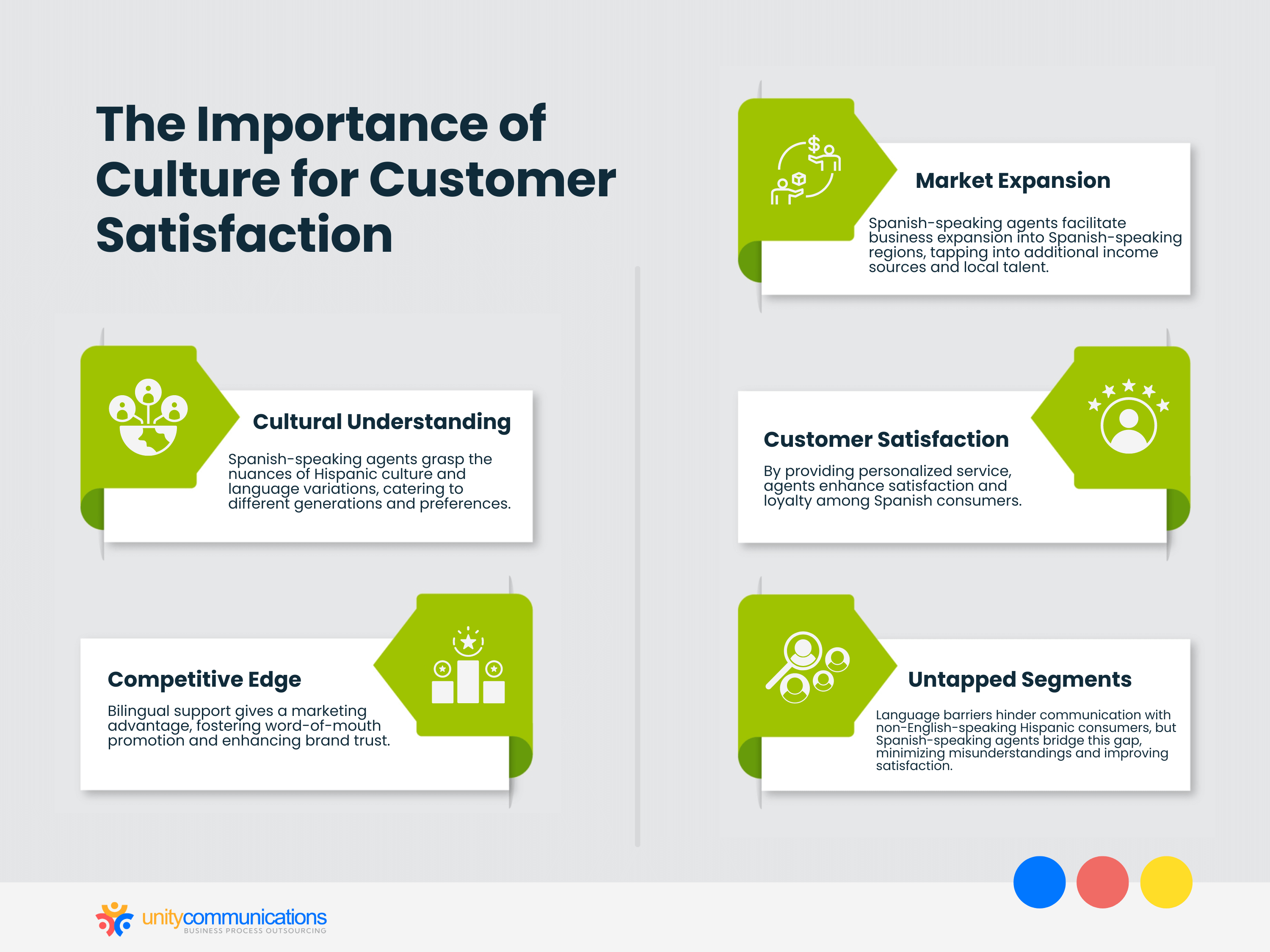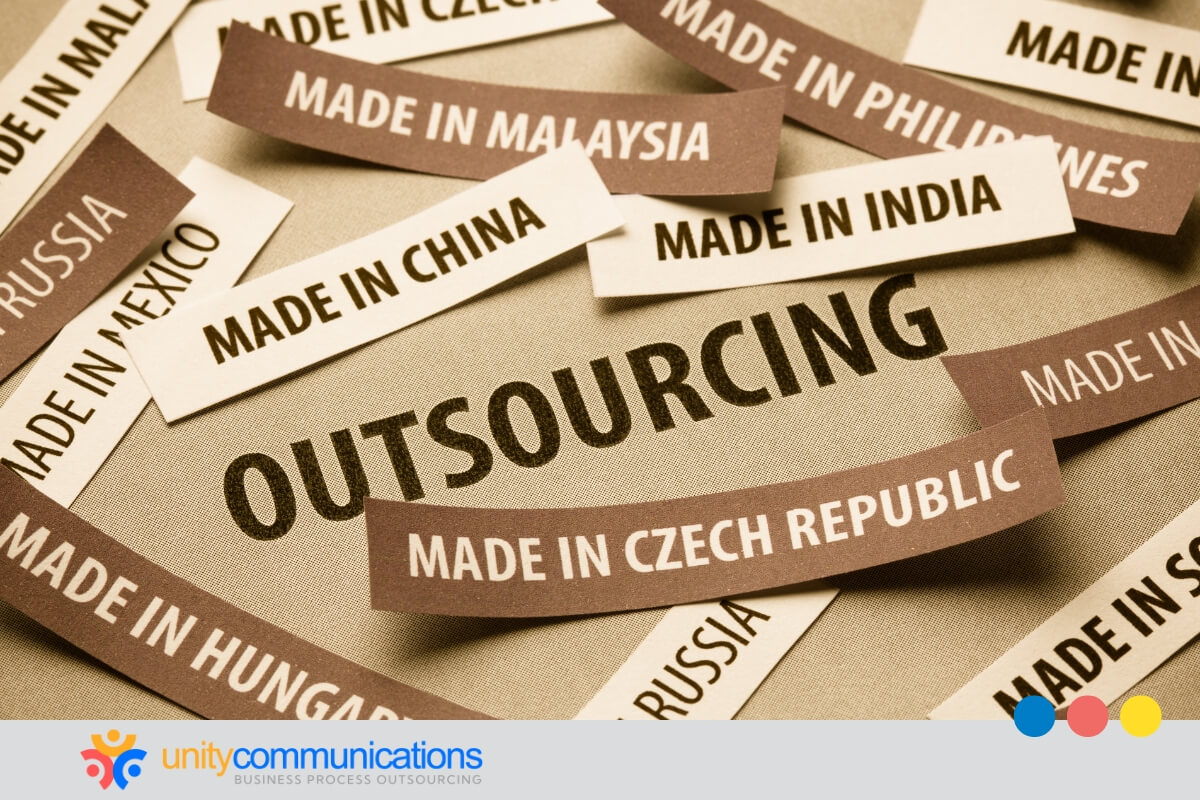Table of Contents
Bilingual customer service representatives (CSRs) and virtual assistants (VAs) in Mexico are in high demand due to their advantages for U.S. businesses.
Mexican CSRs and VAs are third-party contractors in the outsourcing industry. Compared to other outsourcing destinations, Mexico offers nearshoring advantages to the U.S.
The country also has a large pool of agents who understand Spanish culture and language and can provide first-rate service for excellent customer satisfaction.
Keep reading to discover why you need Spanish-speaking professionals for your customer service operations and how to outsource them.
The Role of Spanish Speakers in the U.S. Business Landscape

Did you know one in five U.S. consumers is Hispanic or from a Spanish-speaking country? Insider Intelligence reports that Hispanic consumers account for over 18% of the U.S. population—roughly 62 million individuals. Over the past 10 years, its population growth has represented about 51% of the nation’s overall population increase.
The research firm states that Hispanic Americans contributed $2.8 trillion, or 13%, to the gross domestic product (GDP) in 2020. Their impact on the local economy is almost three times that of non-Hispanic groups. They will likely have a buying power of $2.6 trillion by 2025, overtaking non-Hispanic whites, who hold the biggest purchasing power.
Adweek also states that U.S. Hispanics’ GDP is growing faster than that of Japan, France, the UK, and Germany. 58% of Hispanic Americans are below 34, and over a quarter of all multicultural individuals in the U.S. are Hispanic and under 18 years old.
Additionally, 13.4% of the U.S. population uses Spanish at home, making it the most prevalent non-English language. The U.S. also has the world’s second-largest population of Spanish speakers, next to Mexico. By 2050, one in every three Americans will be fluent in Spanish, including bilinguals who use English.
This overview of the Spanish-speaking market can help you understand the significance of language and culture for ensuring customer satisfaction.
The Importance of Culture for Customer Satisfaction

Spanish-speaking agents are among the CSRs who can best understand Hispanic culture and language for improved customer satisfaction.
Here are a few ways Spanish-speaking CSRs can help you reach the lucrative Hispanic consumer market:
Have a Deeper Understanding of Spanish and Its Cultural Aspects
Spanish is widely spoken worldwide. However, Spanish-speaking countries use the language differently, just like English has different variations in the UK, Australia, and the U.S. The Spanish spoken in Latin America (LatAm), the U.S., and Spain varies in cultural subtleties, pronunciation, grammar, and colloquialisms.
Spanish-speaking agents know the cultural and generational differences among Hispanic Americans. As such, they can localize and personalize support for better customer satisfaction. Below are the general groups of Latinos in the U.S.:
- First and second generations. These groups consist of immigrants and their immediate children, who must learn to speak English fluently. These traditionalists favor Spanish-language media (e.g., TV, radio, and social media).
- Third generation. These Hispanics were born and raised in the U.S. While keeping their cultural roots, they adopted American habits and lifestyles. Spanglish (Spanish and English) is their preferred language form, and Spanish-speaking agents can quickly adapt to this cultural bias for greater customer satisfaction.
Many Hispanic customers prefer individualized communication. Spanish-speaking agents can recognize subtle language distinctions and provide a culturally specific, personalized service for excellent customer satisfaction. With each encounter, these professionals can help customers feel at ease.
Drive Competitive Advantage for a Stronger Marketing Edge
CSRs who know the culture of buyers or end users can provide first-rate service for exceptional customer satisfaction. Their bilingual skills can assist you in gaining a business edge in your industry.
Your competitors undoubtedly have non-English-speaking customers. However, not all these companies have customer support that caters to their mother tongue. Your organization can fill this gap.
You hire Spanish-speaking CSRs to help overcome the language barrier when interacting with Hispanic customers. Serving customers in their native tongue allows them to capitalize on word-of-mouth marketing, wherein satisfied customers talk about their experience to family and friends.
Check out the benefits of an effective word-of-mouth strategy:
- Enhances consumer trust and brand awareness. When potential buyers receive positive feedback about your product or service from reliable sources, they are more inclined to trust your company. Improved brand trust also generates more attention for your business. New customers will continue to spread information about your products.
- Increases sales cost-effectively. Spanish-speaking agents who know the importance of culture for greater customer satisfaction help reduce advertising costs. Word-of-mouth marketing is an affordable way to promote your products or services to potential buyers compared to print or online ad campaigns, which are costly and time-consuming.
Tap LatAm and European Markets for More Spanish-speaking Customers
Over 20 nations, mainly on the LatAm continent, have Spanish as their official language. These countries include Argentina, Bolivia, Chile, Colombia, Peru, Uruguay, and Mexico. The region offers several opportunities for business expansion.
You can also enter European markets where Spanish is widely spoken, such as Spain, Gibraltar, Andorra, and Switzerland.
Agents who comprehend Spanish culture can help you run overseas operations for broader customer service and satisfaction. They are the most suitable professionals to represent your company, managing daily transactions and consumer support for the LatAm and Spanish markets. Thriving in foreign locations with these CSRs is possible.
Some perks of entering new markets:
- Additional income sources. Foreign expansion helps diversify your firm’s markets and increase income. It also protects your business from unforeseen events. The company’s overseas sales can offset the dismal performance of your local operations. Additional markets ensure you no longer rely on a single or a few revenue sources.
- Easier access to more talent. When entering overseas markets, you can hire regional personnel with specialized skill sets and experience. You can find extra workers more familiar with the market culture to help you deliver top-notch operational support for improved customer satisfaction.
Gain Loyalty Among Spanish Customers for an Additional Income Source
With a GDP of $1.42 trillion in 2022, Spain is one of the world’s strongest economies, trailing after the U.S., China, Japan, and the UK. Spanish consumers have more purchasing power than most global markets. The country’s per capita income was estimated at roughly $27,000 as of 2021.
Spanish customers can be challenging to satisfy and highly sensitive to prices because of the economic crisis they experienced in the mid-2000s.
Santander Trade reports that price sensitivity among the populace contributes to a need for brand loyalty. When shopping, 75% of Spaniards look for a discount before purchasing, while 25% switch to retailers offering lower prices.
Statista reports that Spain had 45.6 million internet users as of February 2024. The country’s e-commerce industry is expected to register a 14.7% growth from 2022 to 2027 and is Europe’s top market for fashion, electronics, and media. It thrives on booming Internet and smartphone usage, leveraging social media to boost e-commerce.
The Spanish market is profitable, but gaining this group’s loyalty requires diligence. Spanish-speaking agents who know the nuances of culture and language can help deliver excellent service for customer satisfaction. These bilingual professionals can please your Spanish buyers and earn and retain their business.
Attract Non-English-speaking Hispanic Customers to Reach an Untapped Group
CSRs well-versed in Hispanic culture and language can offer high-quality assistance for better customer satisfaction. They can allow your non-English-speaking consumers to communicate in Spanish instead.
Pew Research reports that while English proficiency among Latinos in the U.S. has grown over the past few years, millions still struggle with the language. In 2022, 42.3 million Latinos speak English fluently. Of the 63.6 million U.S. Hispanics, around 21.3 million have trouble understanding English.
Using solely English in customer service might lead to mistakes and misunderstandings with Spanish-speaking customers. Below is the impact of a language barrier between CSRs and your buyers:
- Poor communication. Customer satisfaction is adversely affected when consumers cannot convey their problems, questions, and issues. Spanish-speaking customers struggling to express themselves due to inadequate English might feel disappointed. This can result in an unfavorable image of your business and customer loss.
- Frequent misunderstandings. Miscommunication and confusion increase when CSRs face a language barrier. Customers might receive erroneous or insufficient information, causing frustration. Miscommunications can also lead to mistakes in service delivery, which can harm the customer experience.
Agents familiar with Spanish culture and language can help minimize language barriers for better customer satisfaction among relevant consumers.
Outsource Bilingual Agents to Drive Customer Satisfaction

So, what is the BPO provider’s role in guaranteeing high customer satisfaction for the Spanish-speaking market?
Hiring Spanish-speaking agents from a business process outsourcing (BPO) company is ideal when your organization lacks the personnel, skill, time, or knowledge to manage bilingual customer service. The vendor leverages professionals well-versed in Spanish consumers, language, and culture to deliver high-quality support for better customer satisfaction.
You can outsource bilingual CSRs to nearshore providers in Mexico, where Spanish is the official language. Established BPO companies in these countries also have the technology and resources to run back-office outsourcing and related processes.
You can enjoy the following advantages when outsourcing to bilingual agents who understand Spanish culture:
Qualified Workforce to Deliver Excellent Services
Mexico has a competent, young, and vibrant workforce, with half a million college graduates ready to enter the job market annually. This abundant supply of young professionals is ideally suited to remote work since they can use digital gadgets, social networks, and computer systems.
They are also proficient in English. Approximately 13 million Mexicans, or roughly 10% of the population, can speak the language at various competence levels. These professionals are also used to American work culture and methods and can provide dependable services for customer satisfaction. They work with minimal supervision and perform tasks effectively.
You must collaborate with a suitable Mexican BPO provider to take advantage of this ample labor supply. It must guarantee its third-party teams have the required job qualifications, education, and technical and soft skills. Aside from customer service, teams must also be knowledgeable and experienced in delivering a variety of services, such as:
- Contact center as a service (CCaaS)
- Bookkeeping and accounting
- Administrative support
- Help desk
- Healthcare outsourcing
- Email and chat
- Data entry services
- Virtual assistance
- Outsourced e-commerce customer service
- Information technology (IT) supports
More Affordable, Efficient Workforce to Maximize Investments
Third-party Mexican professionals who can utilize Spanish culture and language to provide superior service for customer satisfaction are as effective as their counterparts in the U.S. and Canada. But while their technical and soft skills are top-notch, their wages are affordable.
Based on Salary Explorer data, the typical base wage of a full-time CSR in Mexico is MXN 12,600, which equates to $739 monthly or MXN 151,000 ($8,855) yearly. Depending on experience and qualifications, a CSR in the U.S. can cost about $3,000 monthly or approximately $36,000 annually.
From these figures, you can save $27,145 annually ($36,000 minus $8,855) by hiring a bilingual Mexican CSR. The significant wage disparity saves you money while maintaining, if not improving, performance and productivity with proficient Spanish-speaking agents.
Regional and Historical Connections for Improved Customer Relations
Third-party Mexican CSRs proficient in the Spanish culture and language can quickly establish rapport with Americans for greater customer satisfaction. The reason is that Mexico and the U.S. share many similarities. Many Mexicans and Americans have families and relatives residing on the other side of the border.
Here are some similarities linking the two nations:
- History. Europe colonized Mexico and the U.S. a few centuries ago. Each year, they commemorate their independence from colonial authority. Mexico celebrates its independence from Spain on September 16th, whereas the U.S. marks its independence from the UK on July 4th.
- Government system. Mexico and the United States have a federal government, with the president serving as the nation’s head of state. Each country is divided into states, each with its own governor and legislature. Both countries’ central law is the constitution.
- Food and drink. Many Americans enjoy Mexican dishes such as enchiladas, burritos, and quesadillas. Mexicans appreciate hot dogs, fries, burgers, and other foods from the U.S. Beer is the most popular beverage in both countries.
Mexican third-party teams are more at ease and confident when speaking with Americans. They can discuss various issues that will help them develop stronger consumer relationships. Compared to their counterparts abroad, their similar culture allows them to offer exceptional service for higher customer satisfaction.
Thriving Outsourcing Industry for Sustainable Business Operations
Third-party Mexican professionals knowledgeable in the Spanish language and culture are among the reasons why Mexico has grown in reputation as one of LatAm’s main outsourcing hubs.
To date, call center services account for over 70% of all BPO activities nationwide. The remainder is split among technical support outsourcing, consulting services, and virtual assistance.
Statista provided the following findings regarding the Mexican BPO sector:
- In 2023, the overall outsourcing revenue is estimated to be $3.87 billion.
- From 2023 to 2027, revenue will expand at a compound annual growth rate (CAGR) of 4.83%. In 2027, the market will be worth $4.90 billion.
- In 2023, the average cost per worker in the BPO industry is expected to be $63.95.
Inbound and outbound call center operations that provide different services have spread across Mexico. This trend indicates that the number of CSRs familiar with the Spanish culture and language is rising.
Inbound call centers include managed services, customer service, and technical support. They also assist with human resources (HR) procedures such as employment and background checks. On the other hand, outbound call centers concentrate on telemarketing, lead generation, and lead qualification.
Flexible Staff and Operations for More Effective Money Management
Many third-party Mexican workers adept in the local language and culture are willing to work anytime, ensuring higher customer satisfaction. Depending on your business situation and requirements, the BPO provider can quickly increase or decrease customer service operations. This capability improves corporate value while optimizing your expenses.
The third-party provider can scale the number of independent contractors or outsourced procedures without disrupting your current operations. Scalability allows you to maximize business value while maintaining a reasonably low cost.
Here are some other advantages of scalable operations:
- Cost efficiency. Lower operating costs are another reason to hire third-party bilingual Mexican CSRs. The BPO firm can secure the proper team size you need. It also assists in identifying the particular processes required to accelerate efficiency and output.
- Agility. The BPO provider helps deal with unforeseen occurrences without interfering with administrative, help desk, or customer support operations. With improved responsiveness, your capacity to remain robust in harsh settings improves.
- Flexibility. Besides bilingual Mexican agents familiar with local culture and language, the third-party provider offers operational flexibility to increase market competitiveness and customer satisfaction. It can promptly adjust outsourced processes, including customer support, data entry services, and administrative functions.
How to Outsource Bilingual Service for the Spanish-speaking Market

Picking the right BPO provider is critical to hiring Spanish-speaking agents proficient in the local culture and language and guaranteeing customer satisfaction. These six steps help you succeed in getting the appropriate partner to outsource customer service operations and personnel:
- Establish priorities and expectations. Evaluate and develop outsourcing strategies with shareholders, employees, and management. Determine the correct staff size, communication channels, and type of outsourcing (nearshore in this case) that meets your requirements.
- Screen BPO candidates. Conduct a careful study of each prospective third-party provider. Analyze its credentials and capabilities. Opt for candidates with a large pool of bilingual professionals knowledgeable in the Spanish culture and language for better customer satisfaction. Also, ask about their data security policies.
- List all service fees and hidden costs. Request a complete list of service costs and extra charges from selected BPO providers to better manage your budget. Inspect their rates and perform comparative analyses of their pricing packages.
- Draft a request for proposal (RFP). Reduce the number of candidates at this point. Prepare an RFP and disseminate it to all willing and short-listed service providers. The RFP must specify the nature of the outsourced project, a due date, cost constraints, and potential solutions.
- Pick the BPO provider that suits your specifications. Engage your new partner in drafting a service-level agreement (SLA) that outlines the type of assistance required and other relevant details. The SLA specifies the conditions of the outsourced tasks, including key performance indicators (KPIs).
- Oversee outsourced operations and interact freely with the partner. Monitor the third party’s performance per the SLA. Regularly track bilingual professionals skilled in the local culture and language for assured customer satisfaction. Maintain constant contact with the partner to discuss status and development.
The Bottom Line
Tapping into Mexican outsourcing services allows you to obtain third-party professionals familiar with the Spanish culture and language to consistently provide enhanced customer satisfaction.
You can gain several benefits from outsourcing. Aside from the benefits outlined above, third-party Mexican teams are ready to work in shifts. They can work around any schedule—holidays, weekends, and different time zones—to service Spanish-speaking customers. Make sure to find the right partner by considering the tips above.
Let’s connect if you want to learn more about capitalizing on the culture and language for superior customer satisfaction in the Spanish-speaking market!




